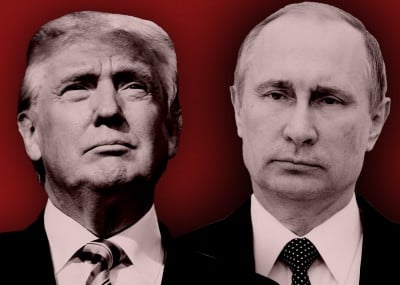Leak of the Trump-Putin Phone Call, Reveals Trump Unfamiliar With Russia Nuclear Treaty

In the past week, the press complained that the White House never published a detailed read out of the Jan. 28 Trump-Putin phone call, one of the first held by the new US president, because allegedly the staff had disabled recording equipment. Today, it was Reuters’ turn to be the latest to leak the full details of a Trump high level phone call (as reported yesterday, leaking within the Trump administration has become a major issue) this time, the highly anticipated if unrecorded call with Russian president Vladimir Putin. Reuters cited two unnamed U.S. officials and one former U.S. official with knowledge of the call.
The leak, while unconfirmed – in today’s press briefing Spicer refused to comment saying it was a private call – revealed several interesting facts, first that Trump denounced the START treaty that caps U.S. and Russian deployment of nuclear warheads “as a bad deal for the United States.”
More notable was the disclosure that “when Putin raised the possibility of extending the 2010 treaty, known as New START, Trump paused to ask his aides in an aside what the treaty was, these sources said.” During a debate in the 2016 presidential election, Trump said Russia had “outsmarted” the United States with the treaty, which he called “START-Up.” He asserted incorrectly then that it had allowed Russia to continue to produce nuclear warheads while the United States could not.
As Reuters adds”it has not been previously reported that Trump had conveyed his doubt about New START to Putin in the hour-long call.”
Under the terms of the New START the two countries have until February 2018 to reduce their deployed strategic nuclear warheads to no more than 1,550, the lowest level in decades. It also limits deployed land- and submarine-based missiles and nuclear-capable bombers.
Previously the new Secretary of State Rex Tillerson said he supported the treaty during his Senate confirmation hearings.
During the hearings Tillerson said it was important for the United States to “stay engaged with Russia, hold them accountable to commitments made under the New START and also ensure our accountability as well.”
The latest leak will lead to concerns that Trump “is not adequately prepared for discussions with foreign leaders”, which may or may not be favorable in future negotiations, as it keeps foreign heads of state very much off balance.
Another unique aspect of this call: Trump did not receive a briefing from Russia experts with the NSC and intelligence agencies before the Putin call, Reuters’ two sources said.
Typically, before a telephone call with a foreign leader, a president receives a written in-depth briefing paper drafted by National Security Council staff after consultations with the relevant agencies, including the State Department, Pentagon and intelligence agencies, two former senior officials said.Just before the call, the president also usually receives an oral “pre-briefing” from his national security adviser and top subject-matter aide, they said.
In the phone call, Reuters also reports that Putin raised the possibility of reviving talks on a range of disputes and suggested extending New START, the sources said.
New START can be extended for another five years, beyond 2021, by mutual agreement. Unless they agree to do that or negotiate new cuts, the world’s two biggest nuclear powers would be freed from the treaty’s limits, potentially setting the stage for a new arms race.New START was ratified by the U.S. Senate in December 2010 by a vote of 71 to 26. Thirteen Republican senators joined all of the Senate’s Democrats in voting for the treaty, although Republican opponents derided it as naive.
During a prior phone call with Australian Prime Minister Malcolm Turnbull, which infamously turned heated and led to Trump prematurely ending the call just 20 minutes in, the US president questioned an agreement reached by the Obama administration to accept 1,250 refugees now being held by Australia in offshore detention centers. It was one of many such conversations in which Trump turned to denounce deals negotiated by previous administrations on trade, acceptance of refugees and arms control.

